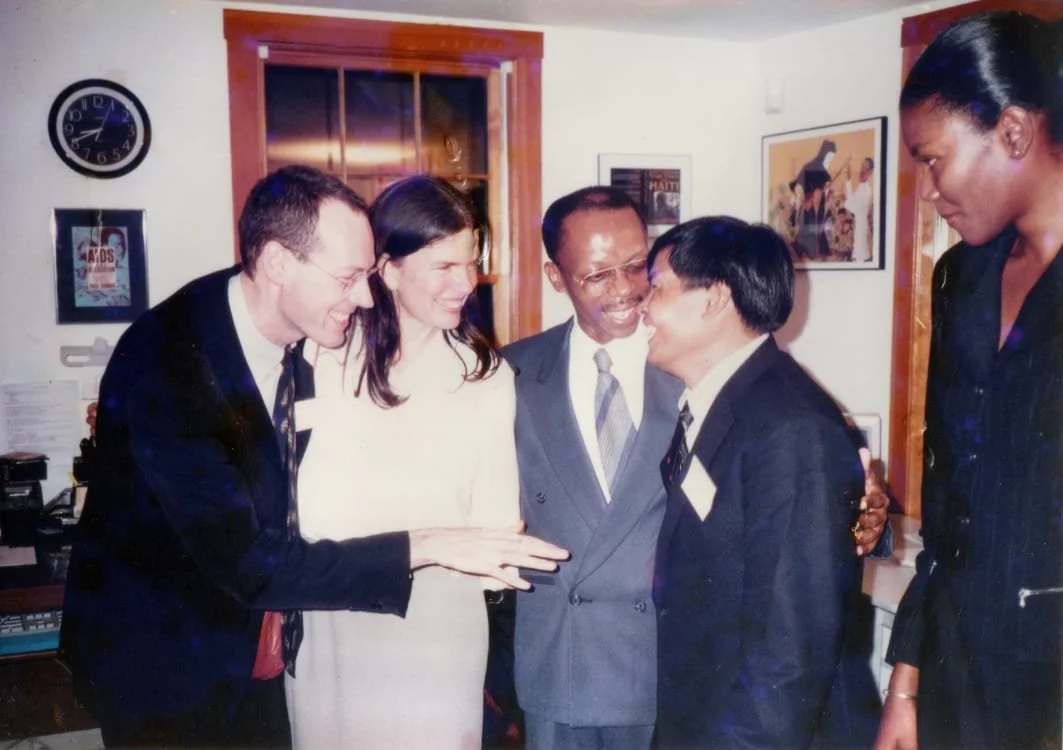In Memoriam
Sok Thim
January 31, 1958-December 7, 2021
Sok Thim was born in Battambang, Cambodia on January 31, 1958 and died peacefully at his home in Phnom Penh, Cambodia surrounded by his wife Theara Mak and son James on December 7th, 2021 after a short illness. The cause was cancer of the pancreas and liver. Other immediate survivors include Thim and Theara’s son Martin who is a student in the US, his mother in Paris, France, and four children from a previous marriage: Sok Soth of Phnom Penh, Kim Yuan and Joseph of Battambang, and daughter Kim Suer of Paris.
After surviving the Khmer Rouge genocide as a teenager, Thim fled to the Nong Samet Refugee Camp on the Thai-Cambodian border where he entered the American Refugee Committee (ARC)’s medical training program in 1982. He completed training first as a nurse and then as a medical assistant and worked in these roles until 1987 when he undertook further training in treatment of tuberculosis (TB) with Bob Maat, the ARC expatriate tuberculosis (TB) coordinator in the pioneering ARC TB program that successfully brought access to TB drugs and care for Cambodian refugees in an active war zone. Thim became the ARC TB Program Coordinator at the Site II Refugee Camp between 1988-1990 and then then was secunded by ARC to UNBRO (the United Nations Border Relief Operation) and assumed the position of TB Coordinator for all the border refugee camps from 1990-1991. The ARC program and its expansion throughout the Thai-Cambodian border camps went on to treat 3,000+ people for TB until the camps were closed.
After his repatriation to Cambodia in 1992, Thim worked as a program manager with the international charity CARE on credit programs for women. The national TB program in Cambodia was still non-functional at the time and so Thim together with Anne Goldfeld and Brian Heidel -- -his ARC colleagues from the border camps - - co-founded the local non-governmental organization (NGO) Cambodian Health Committee (CHC) in 1994 to provide access to TB care in Cambodia. CHC started operations in the region of Cambodia with the highest TB burden at the time, Svay Rieng. Thim served as CHC’s Executive Director from 1994 to 2000, its Research Coordinator from 2000-2008, and again its Executive Director from 2008 to 2014 when he retired. He completed his medical degree at the International University of Phnom Penh between 2004-2008 and received his M.D. degree in 2008.
During Thim’s leadership, the CHC initiated: community-based TB care in the country of Cambodia in 1994; developed, piloted, and helped scale up Community TB DOTS with the country’s National TB Program (NTP) in the early 2000s, credited by the WHO for the significant decrease in Cambodia’s TB prevalence in the first decade after it started; integrated microfinance with TB care and cure; initiated antiretroviral therapy (ART) and TB/HIV integrated care for adults and children in rural Cambodia in 2003 (first in Svay Rieng and later in Kompong Trach); established a pediatric ART clinic at the Khmer Soviet Hospital that cared for 589 children in its first year in 2009; and, launched drug resistant TB (DR-TB) care in Cambodia in 2006, which was scaled up countrywide and delivered in partnership with the NTP until now.
Thim served as the Principle Investigators (PI) of the US National Institutes of Health (NIH) CIPRA grant to ‘Build Centers of Clinical and Research Excellence for TB and HIV in Cambodia’, and he was one of the three PIs of the French ANRS and US NIH co-sponsored CAMELIA randomized clinical trial in Cambodia with F. Xavier Blanc and Anne Goldfeld. The CAMELIA showed that early ART timing in TB/HIV co-infection resulted in significant reduction of mortality in highly immunosuppressed individuals, which provided the data for the WHO’s new recommendation to start ART early in TB/HIV co-infection. Thim’s field experience and focus on decreasing loss of follow-up of patients and on developing strategies to promote adherence to TB and HIV medications significantly contributed to the robustness of the CAMELIA findings. As well, his work to transform the dilapidated pulmonary ward of the Khmer Soviet Friendship Hospital in Phnom Penh, the largest public hospital in Cambodia, which was a major CAMELIA recruitment site, into a center of excellence and training not only benefited the trial, and but also greatly benefited countless other patients.
In 2008, under the name ‘Global Health Committee (GHC)’, Thim and CHC provided hands-on training to the Ethiopian medical team that was to lead the treatment for drug-resistant (DR)-TB in Cambodia and in Ethiopia, and he helped launch the Ethiopian countrywide DR-TB program, which in 2015 reported the best two-year DR-TB survival and positive outcomes in Sub-Saharan Africa.
After retiring from CHC in 2014, Thim worked as an independent consultant and as a clinical advisor to Marie Stopes International in Cambodia. He was a co-author on numerous manuscripts throughout his career that described TB and DR-TB treatment and prevention, the nesting of science in TB and HIV clinical networks, and he co-authored, “Curing Tuberculosis: a manual for developing communities”. He received the Thomas J. White Prize from Partners in Health in 1996 for ‘working with the poor’; and, with Anne Goldfeld was named ‘Hero of Global Health’ by Time Magazine in 2005 and received the Cambodian Prime Minister’s ‘Medal of Honor for Reconstruction of Cambodia’ in 2009.
Thim will be remembered for his creativity, quick mind, discerning insights, and for making the human right of health a reality for so many. His easy laugh, great sense of humor, and his loyal friendship are greatly missed.
Healing the world one life at a time
Sok Thim, on the occasion of being awarded the ‘Thomas J White Prize for ‘Working with the Poor’, from Partners in Health on Oct. 6, 1996. Left to right: Paul Farmer, Anne Goldfeld, Jean-Bertrand Aristide, Sok Thim, Didi Bertrand Farmer.

